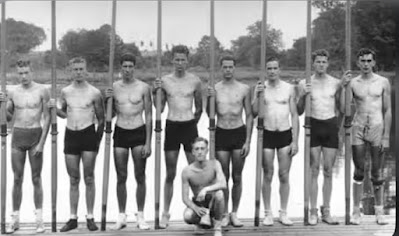Great crews may have men or women of exceptional talent or strength; they may have outstanding coxswains or stroke oars or bowmen; but they have no star. The team effort—the perfectly synchronized flow of muscle, oars, boat—that is the key.
A life without challenge, a life without hardship, a life without passion, a life without purpose, is no life at all.
BERLIN, MAY 1936—three years before the end of the Great Depression and the start of World War II. Adolf Hitler has spent millions sprucing up the city to demonstrate German dominance to the world. But on a placid lake in the suburb of Grünau, a crew of no-name rowers from the University of Washington challenges the favored German and Italian teams for one of the most thrilling finishes in Olympic history. In his best-selling 2013 book The Boys in the Boat, Daniel James Brown details the events that led to that race, focusing especially on Northwest native Joe Rantz.
For this story, which has captivated more than two million readers to date, we have Joe Rantz’s daughter Judy Willman to thank.
It was Willman who introduced Brown to her dying father, and whose tireless research helped bring the tale to life. This month, the PBS series American Experiencebrings the story to the small screen, with never-before-seen news footage and reenactments shot at the UW boathouse where it all began.
"Joe Rantz is the ultimate underdog," he said. "He was abandoned by his family continuously until he was 13, until the nail in the coffin from his dad and his stepmother when they left him forever. Joe was 13 years old and decided what happened wouldn't define him. He was able to pull himself up by his bootstraps and do the impossible. I find him so inspiring, and then what he was able to do in the boat as well was remarkable."
Clooney confirmed that the appeal of an underdog story is universal, even with people who aren't one.
"I think everybody considers themselves an underdog. I've met really rich, successful people who were like, 'Yeah, we barely made it through on that one.' I think everybody, in their heart, thinks of themselves as one," he laughed. "I think we like these stories because most of the time, we've seen that it doesn't work out, so when they do work out, we enjoy them and look forward to them. Sports movies and war films, in particular, do that really well. People don't love to watch A Bridge Too Far and see everybody lose at the end."
George Clooney Took A Financial Hit To Get ‘The Boys In The Boat’ Made

